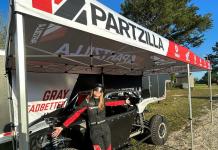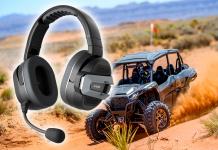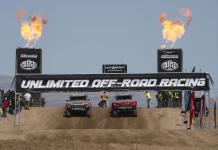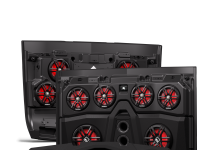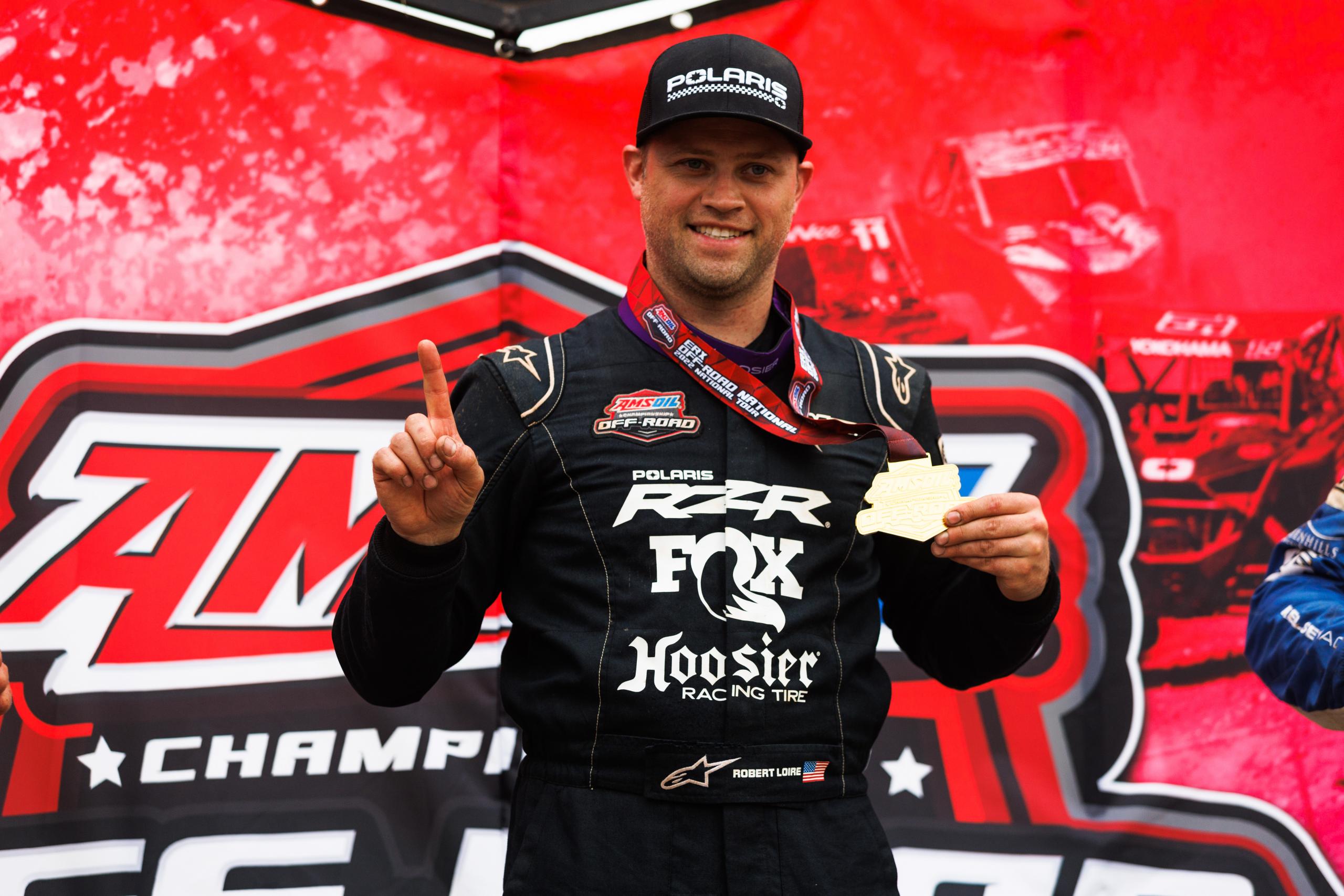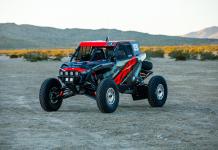No matter the type of motorsport, most major racing series have a unique mix of competitors: professional racers whose only job is to go win, those who aspire to fill that role, and those who are simply there to have fun as a release from their day job. For Championship Off-Road Pro Turbo SXS driver Robert Loire, though, it’s a mix of all of the above: not only is he a front-runner in the series as a privateer, he also works as an engineer for Polaris when he’s not at the race track.
All that goes to say that things have been trending pretty well for Loire recently. Alongside some of the major RZR unveils that have reshaped the UTV industry as it stands, his own racing season has been pretty stellar, with two wins in the month of July at ERX Motor Park and Dirt City Motorplex. Earlier this month, before he took yet another victory at Bark River International Raceway, we sat down with Loire to talk about his season so far, how his racing successes help support his engineering role at Polaris, his advice for aspiring racers, and of course, his RZR of choice for a fun run:
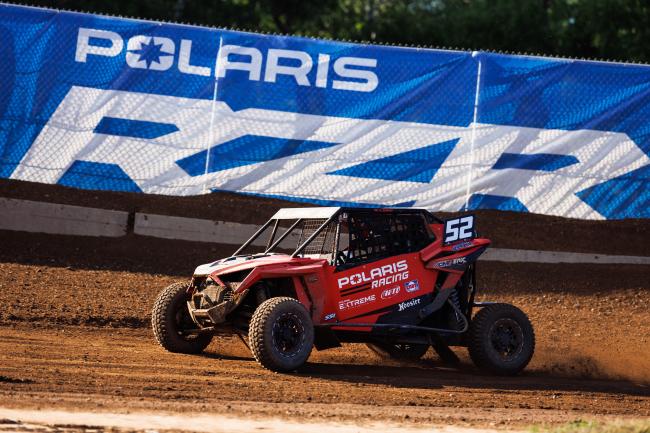
Let’s start by talking about your day job. Obviously you run on the Championship Off-Road tour, but it’s not your day job—when you’re not racing, you’re working at Polaris. What can you tell us about what you do on a daily basis with the company?
I’m a senior engineer at Polaris, and I work in the off-road group with the suspension and chassis teams.
How’d you get into engineering and end up with a company like Polaris? That has to be a dream job for a ton of people out there who would love to get into the industry. How did you break in?
Growing up, I had been racing quite a few different things, mainly motocross and then some Supermoto stuff, and I just enjoy working on stuff and wrenching on stuff. And people that I knew in the engineering industry kind of just said, ‘Hey, why don’t you go to school for this type of stuff?’ And you can do your hobby, basically for a career.
So I decided to go to engineering school. And right as I was graduating, I had a friend that worked for Polaris and just kind of told me, ‘Hey, you should apply.’ And I kind of applied just as… I mean, I didn’t think I would ever get the job or anything like that. But I got an interview, went for the interview, and I’m like, oh, this actually, this could be pretty cool. I got the job and yeah, the rest is history, I guess.
How long have you been working with Polaris compared to how long you’ve been racing?
Well, I guess I’ve been racing for… It’s probably about 20 some years between everything that I’ve raced in the past. Like I said, I started off on dirt bikes, and then I did Supermoto. And then as soon as I came to Polaris, which was about nine years ago, I actually started in the snowmobile department. And right as I got hired, I actually went out and bought a snocross sled and converted that over to cross country, and did some cross country snowmobile racing for a couple years. And then I decided that I’m not a huge fan of the cold! So I decided to switch gears a little bit and try racing some UTVs. That was about five years ago—I think this was my fifth year racing UTVs.

Polaris RZR has been certainly the dominant brand in UTV racing of all types. But what makes UTV racing so fun and so exciting, compared to some of the other racing that you’ve done? And what makes it even more fun to be able to do it while also working for Polaris?
I drove quite a few UTVs in my past, between working here and just having a lot of friends with different manufacturers. I still believe that the RZR is by far the most fun vehicle and the most capable. And just being able to just jump in the vehicle with minimal changes and go out there and win races is pretty cool, especially when you can take some of your learnings back to your day job!
Between working for Polaris and racing, obviously your schedule is pretty full. Anytime you go to a Championship Off-Road race weekend, you’re usually getting on track multiple days. For some of our readers that may not really know as much about UTV racing, and are more just kind of casual or just drive for fun, what’s a typical schedule like for you on a race weekend, and how do you prepare for each step of the way?
The week coming up is pretty hectic. My wife and I make sure the vehicle is ready, and then we have to pack the RV and the trailer and everything. And of course I have my day job at Polaris, so all that stuff is done after work, after hours. So it’s every day coming up until we leave that we’re getting everything ready. And then it’s usually on Thursday, I come home right from work, hop in the RV, drive to the races, get there, hopefully by midnight, get all parked.
When we’re there, usually Friday is practice and qualifying. We’ve got tech inspection in the morning, and there’s usually some wrenching and stuff that still has to be done, so it gets pretty hectic. After practice and qualifying, we have to wash the vehicle and get it ready to go for the next two days of racing. Luckily, our finals are usually near the end of the day for the night shows, so that helps us give us enough time to get the vehicle ready. But then, again, after the first day we have to tear the vehicle all down, wash it all up, and make sure everything is good. If any parts failed or if we broke anything, we’ll replace those, and make sure we’re ready to go and do it all again the second day. So it’s at minimum three full days there, but some of the bigger events we’re there for an extra day.
There are a lot of other big names running RZRs in Championship Off-Road. Who are some of the other drivers that from a Polaris standpoint that run with you? Do you share data at all, or are your teams kind of separate from one another and you don’t necessarily work together on a race weekend?
Andrew Carlson is a big one, and new for this year, we have CJ Greaves. I try to stay friendly enough with the other competitors. I mean, deep down inside, I still like to win of course, but I like the brand to win too. So I’m definitely open to helping out those guys where I can, and we’re all on good terms.

It’s been a pretty solid year overall for the RZR racers in Championship Off-Road, and you managed to get your first victory of the season in the second race at ERX, which is a home track for a lot of you, and where Andrew’s race operations are based. Let’s start with that victory—you’ve been putting a pretty good season together so far, but what really clicked in that ERX round to be able to take that victory and get on top of the box for the first time this season?
You mentioned one good thing there: it’s close to home, and we’ve been there quite a bit. Andrew and I worked together quite a bit in the past, so I’ve got quite a few laps at the track. But so does everyone else, so it’s not like we have any crazy big advantage there.
I think confidence going into it was probably the biggest thing, and having all the friends and family and coworkers support there kind of helps you amp it up a little bit and push that little extra. That day, my spotter and I kind of went into the race like, we’re either going to win or we’re going to get towed off the track. Our mindset was either win or lose. So yeah, we definitely pushed a little extra hard that day.
And then, to be able to back it up at a track like Dirt City in your next race… that track’s kind of got a reputation for sometimes being tough to pass. And obviously you put yourself in a good position where you were running in a podium position, but you managed to capitalize and be able to lead that last lap and take that second victory. What does it mean to you to be able to back up a win so quickly with another victory?
Yeah, that one caught me off guard! That track is definitely not my favorite. Like you said, it’s a driver’s track—it’s very difficult to get a good line throughout the track, but going into that last race, we changed our mindset up a little bit. We had gotten a flat tire the day before, and we just wanted to just get through the weekend clean. And we did make some big mistakes in the beginning, but we kind of regrouped and just stayed calm and wanted to make sure that we finished. So we didn’t push the car too hard, and in the end, we were able to take the win. Just being fast and consistent definitely paid off.

That speed and consistency have definitely helped as far as the championship standings go, where you’re sitting somewhat comfortably in the top five now. How are you feeling momentum wise going into end of the year?
I think we’re in a really good spot. We’ve obviously got the machine figured out this year. Hopefully the bad luck with some flat tires is in the past and have some good clean races. I know we’ve got the speed and the equipment. Bark River is probably one of my favorite tracks, so I’m really excited to get back there. And last year we didn’t have the greatest results—we had some issues, but we’ve got all that stuff figured out for this year. So as long as luck is on our side, everything should go really well.
And then of course, Crandon’s a whole other beast, being the biggest race of the year. Sometimes I let my nerves get to me at that track, so again, hopefully we can just put together a good clean race there.
Crandon’s obviously a special one—it’s one of the biggest events of the year, and Polaris serves as a major sponsor of it. And I know that everybody’s always going to be putting full focus on an event like Crandon. From the driver’s standpoint, when you pull up to the starting line, it’s so different from everywhere else with the land rush start. What’s that experience like behind the wheel, especially in this class where you’ve got so many top tier vehicles? If you’re a viewer and you’re watching UTV races at Crandon for the first time, how does it compare versus the pro trucks? In terms of the field size and how closely matched you all are, it always seems to put on one of the best races every single year.
Right? I mean, lining up on the starting line there, it is one of our only races that’s a land rush start. So we’re all at a dead stop and lined up next to each other, and the competition this year is so tight. Past years, if you got a good reaction timing or a good jump, or if you had a good vehicle, you could sometimes edge out the other guys and get through there pretty clean. But these last two years in the Pro Turbo class, it’s tight. All the vehicles are good, and it’s basically anybody’s start at that point. So you have to be completely on top of your game for that start so you can get that little bit of an extra edge to try to get out front.
Last question on the racing end before we get back into your roles in the engineering world. What kind of advice would you give to those who are interested in getting into UTV racing? Whether it’s kids looking to start young or somebody who wants to go sportsman racing, what are some of the most important things that you’ve learned along the way that have helped you to be able to go run up front and take wins?
Probably the biggest thing is, take it slow. Don’t rush into it. That’s one of the things I wish I would’ve done. I jumped right into the Pro class. In hindsight, I wish I would’ve started in the Pro-Am or the Sportsman class. In the long run, it’ll help you prepare you for the future.
But probably one of the biggest things, too, is to have fun. Take it all in; meet new people, friends, family, competitors. I mean, that’s probably the coolest part of racing is just all the people that you meet and all the competitors.

Taking this back to your day job and engineering: we know that part of the reason why a company like Polaris races is because there are things that you’re able to learn when you’re on the racetrack that you’re able to bring back and use to be able to strengthen the rides that consumers are buying. When you’re headed to the racetrack and when you’re paring over data afterward, are there any particular things that you’re looking for? What are you able to directly bring back to your 9 to 5 from what you learn on the track?
I think one of the biggest things we look for is the duty cycle or the usage cycle of a top tier driver. At the end of the day, we have to design vehicles that meet just a huge, vast level of driving skills. It needs to be fun for the beginner, but it also needs to withstand the huge, big bumps and hits. If you look at the Pro R and the Turbo R, I mean, those vehicles are just insane. Every time I get in one, it just blows my mind. And being able to push those vehicles to the limits and capture those types of drivers, I feel like that’s where I can bring back a lot of experience, just from a racing standpoint and a top-level driving skill set.
You mention the Pro R… when Josh (Martelli) prepped some of these questions for me, he wrote “rumor has it Polaris is working on a 10 cylinder, thousand horsepower RZR with a top speed of 236 miles per hour.” And he wrote it as a joke, but there’s no denying that Polaris has really taken leaps and bounds over the past few years with what you’ve done for the UTV industry. The Pro R in particular has also been a game changer. We know there’s only so much that you can ever say at any given time while things are under development, but what are you focused on as an engineering team over the next few years, as you’re continuing to push the RZR brand and the UTV industry as a whole forward?
I mean, all of the manufacturers right now are just pushing the envelope, and it’s exciting to see Polaris continuing to lead the way. It’s crazy to think about, because a couple years ago at King of Hammers or the big desert races, people were building their own type of vehicles and what they want as a race machine. And now the vehicles that we race, and that do KOH and Baja, are basically stock Turbo R or Pro R vehicles. So it’s just crazy how far the vehicles have come along, and I don’t think it’s going to stop anytime soon.
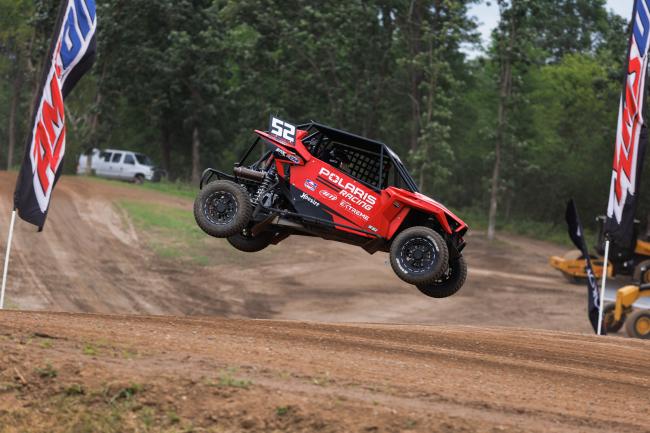
No doubt. And finally, out of the current RZR lineup… again, we’ve talked about how just the past few years in particular have really just moved the industry forward by leaps and bounds. Out of everything that’s out there right now, if you were just picking one stock vehicle, what would be your favorite to drive? And for bonus points, what color scheme would you take it in as well?
That’s a tough one! I’d like to say just your standard Pro XP, because every time I get in one of those and go trail ride and go through the tight twisties, it’s like holy cow. These things are just insane with how much they feel like they’re on rails going through the tight turns. And then when I hop in a Turbo R, that’s another one of my favorite vehicles. So I’d almost have to say the Turbo R, because every time I hop in that thing, that thing blows my mind. I mean, you can hit any crossing or jump or hole, and it just soaks it up like nothing. Like you can have a coffee in one hand and it’s just going through massive whoops. And then, the more you push the thing, it seems like the better it handles, even through the twisties.
So yeah, I think the Turbo R is probably on the top of my list. And I’ve always been just a standard, simple black, fan. So I think that’s probably be my color scheme, maybe with a little bit of red, like the new color scheme that they came out with the all black and just the very subtle red accents.
For sure. Have to match the colors on your race car, right?
Yep!
Images courtesy of Polaris RZR



